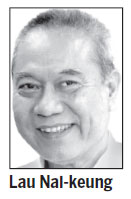Learn politics, or you'll die
Updated: 2012-11-13 07:13
By Lau Nai-keung(HK Edition)
|
|||||||

Politics is given a bad name by the establishment and the patriotic camp. The fact is, we need more politics, not less. The way the government is currently depoliticizing issues by making the problems purely administrative has once and again proven to be wrong. I will give three examples.
First is the Lung Mei beach controversy, where local environmental groups are opposing the government's plan to build a man-made beach in Lung Mei, Tai Po. This is all deja vu, and we would think the SAR government should have come up with a better response by now. But no, it is still giving out the same old line: that the project had gone through all studies, consultations and assessments, according to due process as required by law, and will proceed as planned.
We all know that this line of defense is not going to work. The same game-play will repeat itself. Protests, verbal insults, activists tied to the site dispersed by force - another good season for the dissidents. In the end, the SAR government may or may not get its way with Lung Mei, but if I were CY Leung, I would be asking myself the only question that really matters "why am I here fighting this battle?"
We need not fight every battle, but we have to define the game. The "administrative absorption of politics" has long gone bankrupt, because the elite - the target of absorption - has changed. While the ex-elite who are currently absorbed failed to lend the government the legitimacy that it needs so desperately, the government is still not willing to change its allegiance. This aspect of the problem with the consultation mechanism has already been discussed more fully in my article last week.
The other problems are the "anti-development" mentality and the broadening of stakeholder identity. Our current system of consultation through the District Council assumes a concept of stakeholder which is geographically-bounded. Let's ditch it. I suggest we gather a list of all projects in various stages. As long as a contract to implement the projects is not granted, they should all go into the list. Then we publicize the list, which must contain thousands of projects, and ask citizens (read dissidents) to give each one of them a green light before the government proceeds with that particular project.
Sorry if the construction workers become unemployed, or people suffering one way or another have to wait indefinitely, but they can always confront the dissidents. Before they get concessions from the dissidents, the administration gains a window to focus on its priorities as stated in CY Leung's election platform.
The second example is the controversy surrounding public consultation on equal rights for sexual minorities. The motion to carry out public consultation was rejected, because DAB and the Liberal Party voted against it, but the fact is that only 33 out of 70 were present to vote. It is plain stupidity for the pro-establishment camp to block the motion and spare the self-righteous dissenters from the embarrassment of having to expose their own brand of conservatism.
I personally would like to see how Jimmy Lai Chee-ying, the good Catholic would handle the issue with his newspaper. Now the opportunity is gone, as the pro-establishment camp likes to present itself as the only group in the world against "progress".
The third example that I would like to give is the ongoing assault on Elsie Leung Oi-sie. The SAR government is currently taking a hands-off approach to the issue, claiming weakly that Elsie has her "freedom of speech" and that it upholds judicial independence. But that is beside the point. The dissidents do not let go of Elsie, because they know what is at stake. If they take down Elsie, they also take down the authority of the Basic Law and the central government.
The SAR government is not even consistent with its hands-off approach. While CY Leung refused to comment on Elsie Leung's speech, or recent remarks made by retired judges, Chief Justice Rimsky Yuen did not hesitate to issue a statement to reject a joint call from former Basic Law Committee researcher, Professor Cheng Jie and Barrister cum CPPCC member Alan Hoo, for Chinese-only appeal judges. Rimsky is digging his own grave as he encourages mistrust and abuse towards opinions from the mainland and the pro-establishment camp.
When will they learn a bit more politics?
The author is a member of the Commission on Strategic Development.
(HK Edition 11/13/2012 page3)